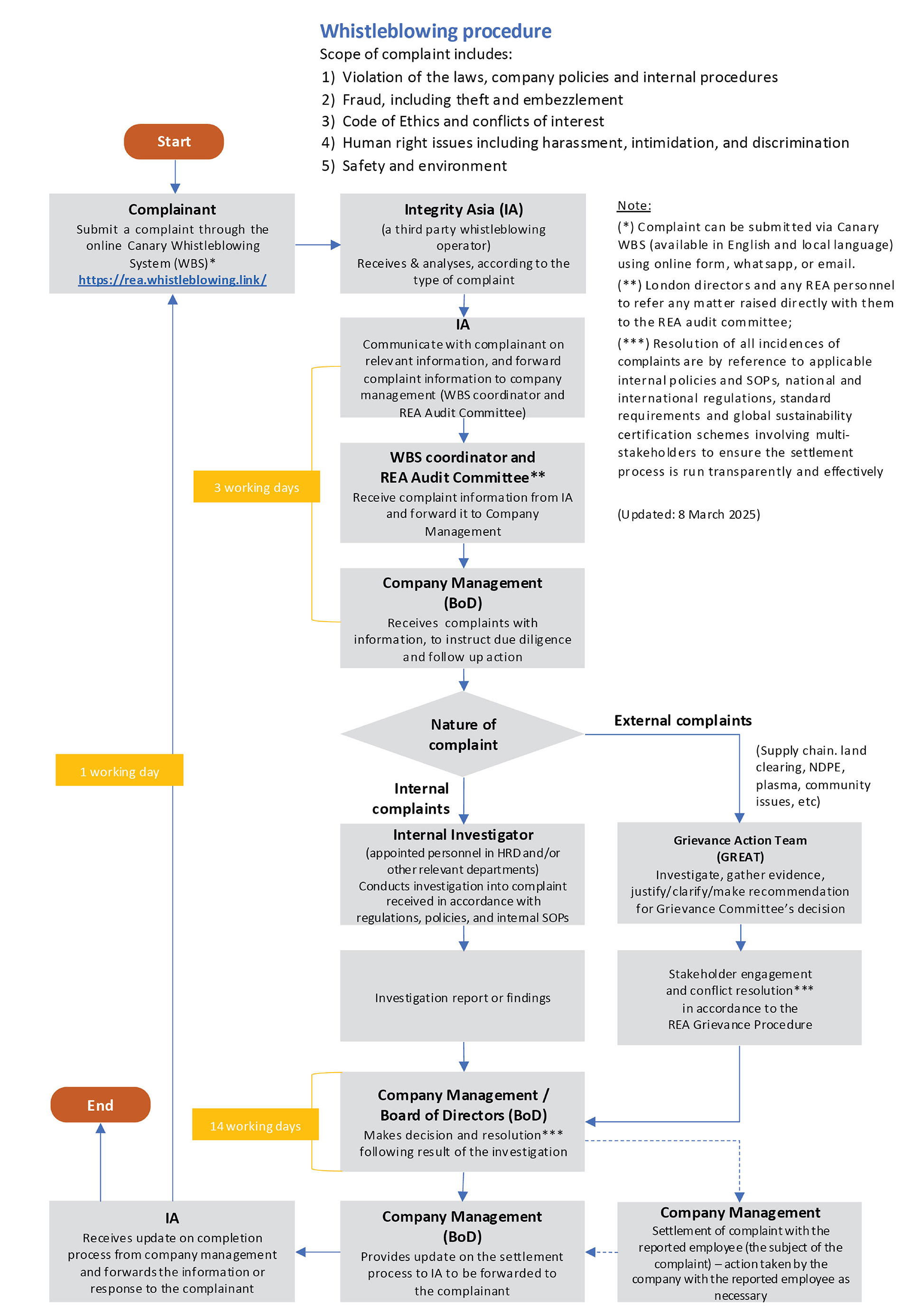Governance: Whistleblowing Procedure


Whistleblowing Procedure
REA, is committed to maintaining the highest standards of integrity, transparency, and ethical business conduct across all its operations. To uphold accountability and foster a safe and responsible environment, REA provides a whistleblowing procedure for all stakeholders, both internal and external, to report any suspected violations, fraud, misconduct, or unethical behaviour.
At REA, we take any complaints and concerns from any individual or stakeholder seriously, including employees, communities, suppliers, and external parties. A complaint refers to any concern raised by an individual or organisation regarding our operations, business practices, or supply chain in relation to any violation against the national regulations, sustainability standards, and/or REA’s company policies. Each complaint is reviewed to determine if it falls under whistleblowing (serious misconduct by employees) or a grievance (operational, supply chain, or sustainability-related issue). If there is an evidenced violation, it is escalated through the formal grievance procedure for further investigation to ensure a fair and transparent resolution process.
All reports submitted through this system will be handled confidentially and monitored by an independent body to ensure fairness, impartiality, and appropriate follow-up actions. Whistleblowers have the option to remain anonymous, and all reports will be treated with the highest level of discretion. No personal information will be revealed without the whistleblower’s consent unless required by law to conduct a thorough investigation.
Whistleblowing is the act of reporting unethical, illegal, or improper activities within the company that could harm individuals, the organisation, stakeholders’ interests, or the environment.
REA encourages stakeholders to report concerns, including but not limited to:
Fraud, illicit, or corrupt practices
- Violations of company policies ([Click here to view policies])
- Conflicts of interest
- Misconduct or unsafe work practices
- Misuse of company assets
- Human rights matters, including workplace harassment, sexual harassment, discrimination, or intimidation
- Environmental, health, and safety violations
- Misuse of confidential information
The Audit Committee reviews and oversees whistleblowing matters to ensure:
- Due diligence and investigations – Ensuring due diligence is conducted through impartial enquiries, evidence gathering and review, unbiased and just resolutions.
- Appropriate Follow-Up Actions – Taking necessary steps based on findings to maintain accountability.
- Integrity and Confidentiality – Safeguarding sensitive information and ensuring the process is handled with integrity.
- Objectivity, Impartiality, and Fairness – Ensuring all parties involved receive fair treatment without bias.
- Proper Response to Whistleblowing Cases – Ensuring board of directors and the management team understand how to respond if a whistleblowing issue is raised directly with them, and identifying any necessary support or training for effective handling.
- Whistleblowing complaints are not only addressed on a case-by-case basis but also analysed collectively to identify trends, recurring risks, and potential systemic weaknesses.
- This approach allows us to address root causes and refine policies, and implement preventive measures proactively.
REA believes that ethical business practices start from within. To promote an open and transparent culture:
- Employees are encouraged to raise concerns through existing internal channels, as detailed below under “How to Report.”
- HRD oversees deployment efforts, ensuring that employees are well-informed of the whistleblowing procedure through:
- Briefings during the new employee onboarding sessions
- Yearly refresher briefings through socialisation to the staff’s Business Unit
- Awareness campaigns e.g., banner, posters, communication by WhatsApp
- Dedicated personnel to guide and support employees by HR in estate and mills.





